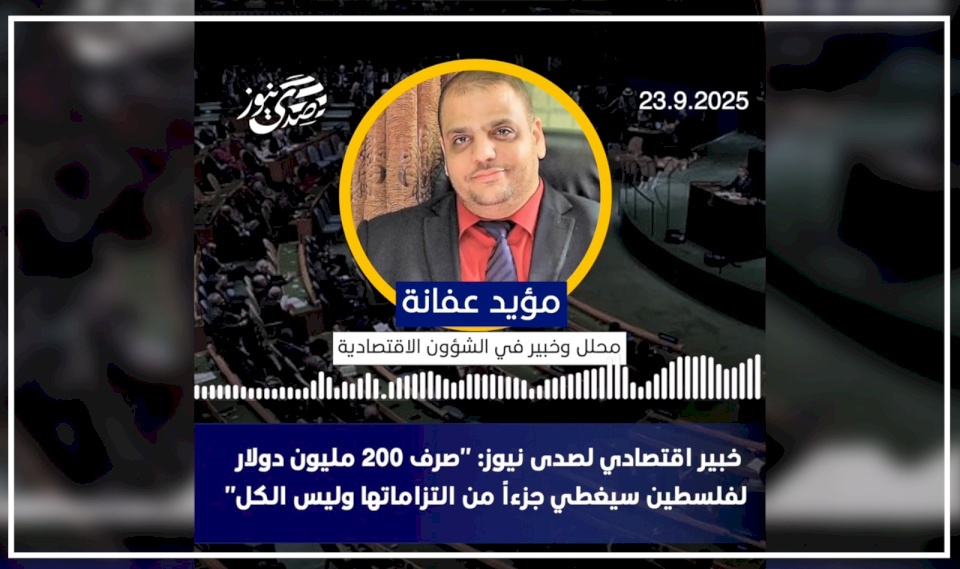
Economic Expert to SadaNews: "Disbursing 200 Million Dollars to Palestine Will Cover Part of Its Obligations, Not All"
SadaNews - As the donors' conference approaches on the 25th of this month in New York, questions are increasing among Palestinian citizens regarding the possibility of paying full salaries to government employees, especially after four countries (France, Norway, Spain, Saudi Arabia) announced an initiative to allocate 200 million dollars monthly for six months to the Palestinian government. How significant is this conference for Palestine?
To listen to the full interview:
Economic analyst and expert, Moayed Afana, answers in an interview with SadaNews, stating: "Disbursing 200 million dollars to the Palestinian government is not enough to cover all employee salaries, as the salary bill alone costs 300 million dollars monthly, which is about 100 million dollars more than the amount that will be granted to the government. In addition, at least 100 million dollars are spent on essential monthly operational expenses (medications, suppliers, books, ministry and various security forces supplies, etc.). Therefore, if these countries fulfill their promises, it is expected that employee salaries will be paid regularly but at a rate of 60-70%,” stressing that "the amount does not cover all government obligations, but it does provide cash liquidity".
Afana added: "The conference is very important, especially under the conditions Palestine is undergoing. We are talking about a halt of all clearance revenues for four months due to a decision by the Israeli Finance Minister 'Bezalel Smotrich', in addition to a 27% contraction in the Palestinian economy due to the genocidal war, whether in Gaza or the West Bank," adding: "Thus, this conference provides emergency support to the Palestinian Authority and the public treasury to bolster the resilience of the citizen and provide a temporary alternative to the withholding of clearance funds".
Afana mentioned to SadaNews: "The original plan during the six months that the Palestinian government will be funded should be to recover the clearance funds that exceeded 10.5 billion shekels. Therefore, if both avenues are pursued simultaneously, the first being an emergency fund for six months, and pressing to recover the withheld funds, there will be positive results".
He pointed to the points raised by Saudi Arabia and France at the "Two-State Solution" conference yesterday, which relate to "inviting countries to participate in the emergency fund and pressuring 'Israel' to release clearance revenue, alongside the necessity of reviewing the Paris economic protocol and changing the currently adopted mechanisms".
Afana does not believe that 'Israel' will respond directly to these points, especially regarding the Paris economic protocol, as it is interested in strangling the Palestinian economy, explaining: "If systematic pressure is applied on Israel, the Palestinian Authority must achieve results to free itself from the Paris economic protocol".

The Problem of Shekel Overcrowding Worsens.. Fuel Station Owners Threatened with Closure o...

The Palestinian Economy at a Crossroads: 4 Files Awaiting Resolution

How Did Leading Stocks Move in the Palestine Stock Exchange Over Five Years?

Public Prosecution Intensifies Monitoring and Accountability Measures Ahead of Ramadan to...

Currency Exchange Rates Against the Shekel (February 14)

Exchange Rates of Currencies Against the Shekel (February 13)

Warning from the Palestinian Capital Market Authority Regarding Calls for Unregulated Inve...
